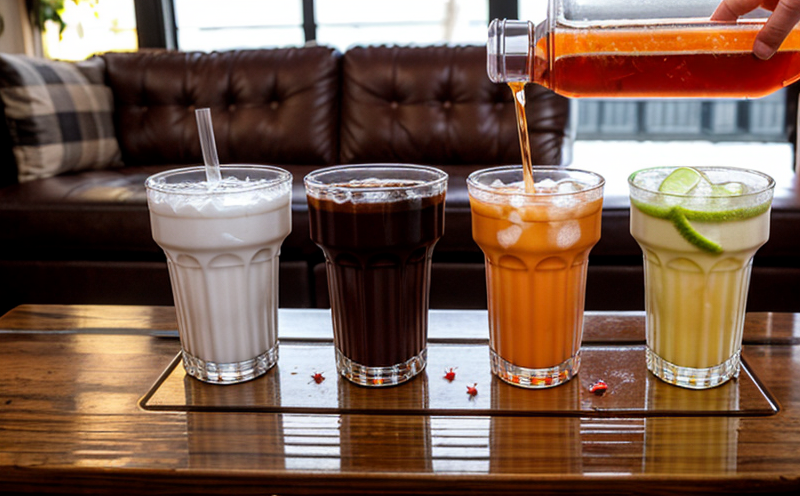USP Alcohol Determination in Spirits
The United States Pharmacopeia (USP) Monograph <611> provides a standardized method for the determination of alcohol content in spirits. This test is crucial for ensuring compliance with regulatory standards, maintaining product quality, and protecting consumers from potentially harmful or misleading products.
The procedure outlined in USP Monograph <611> involves the use of a gravimetric method to measure alcohol content. This method is based on the principle that the loss of mass when alcohol is removed from an alcoholic beverage by distillation correlates directly with its concentration.
The process typically begins with sample preparation, which includes ensuring that the spirit is representative and free from contaminants. The sample must be distilled under controlled conditions to ensure accurate results. After distillation, the residue left behind in the flask is weighed accurately. This weight along with the initial mass of the sample allows for the calculation of alcohol by volume (ABV).
The precision and accuracy of this method are paramount. It relies heavily on the quality of the apparatus used, which includes a suitable distillation flask, vacuum system, and analytical balance capable of providing precise measurements to at least four decimal places.
Compliance with USP Monograph <611> is essential for the food and beverage industry. It ensures that products meet stringent quality standards, thereby safeguarding public health. Non-compliance can lead to legal issues, loss of market share, and damage to brand reputation.
The importance of this test extends beyond mere regulatory compliance. It also plays a role in product development by allowing R&D engineers to fine-tune their formulations for optimal taste and effect. For quality managers and procurement officers, ensuring adherence to these standards is critical for maintaining consistent product quality and cost-effectiveness.
Recent advancements have seen improvements in distillation techniques and analytical equipment, which enhance the accuracy of alcohol determination. These enhancements are particularly beneficial when dealing with complex mixtures found in modern spirits.
The USP Monograph <611> method is widely recognized for its reliability and reproducibility. It has been adopted globally by regulatory bodies, ensuring consistency across different markets.
Eurolab Advantages
Eurolab offers unparalleled expertise in the application of USP Monograph <611> for alcohol determination. Our team comprises highly trained professionals with extensive experience in food and beverage testing, ensuring that clients receive accurate, reliable results.
We utilize state-of-the-art equipment, including precision balances and sophisticated distillation apparatus, which guarantees the highest standards of accuracy. Our laboratory is equipped to handle a variety of samples, from clear spirits to complex mixtures, with consistent reproducibility.
Eurolab's commitment to quality is reflected in our adherence to international standards such as ISO 17025 and IEC standards, ensuring that all test results are valid and acceptable worldwide. We also provide comprehensive reporting services, offering detailed insights into the alcohol content of your samples.
Our client-centric approach ensures that we understand your specific needs and can tailor our services to meet them. Whether you require routine testing or one-off assessments, Eurolab is here to support your quality assurance programs.
International Acceptance and Recognition
The USP Monograph <611> alcohol determination method enjoys widespread international acceptance. Regulatory bodies in countries such as the United Kingdom, Canada, Australia, and parts of Europe recognize its validity.
This recognition is crucial for businesses operating across borders or aiming to export their products internationally. Compliance with this standard ensures that your products meet global standards, thereby facilitating smoother trade processes and enhancing market access.
The method's acceptance extends beyond regulatory compliance into the realm of product quality assurance. It provides a robust framework for ensuring consistency in alcohol content, which is vital for maintaining consumer trust and satisfaction.
Competitive Advantage and Market Impact
Adhering to USP Monograph <611> can provide significant competitive advantages for businesses in the food and beverage sector. By ensuring that your products meet these stringent standards, you position yourself as a leader in quality and reliability.
This can translate into enhanced consumer confidence, leading to increased market share and customer loyalty. In an increasingly competitive market, maintaining product integrity is key to standing out from competitors.
The method's acceptance by international bodies also opens doors for expansion into new markets. Businesses that are already compliant with USP Monograph <611> can leverage this as a selling point, attracting global clientele and fostering partnerships.
The method's robustness is especially beneficial in the context of market regulations becoming more stringent. By staying ahead of these changes, businesses can avoid costly compliance issues and maintain their competitive edge.





